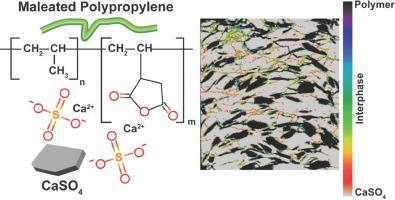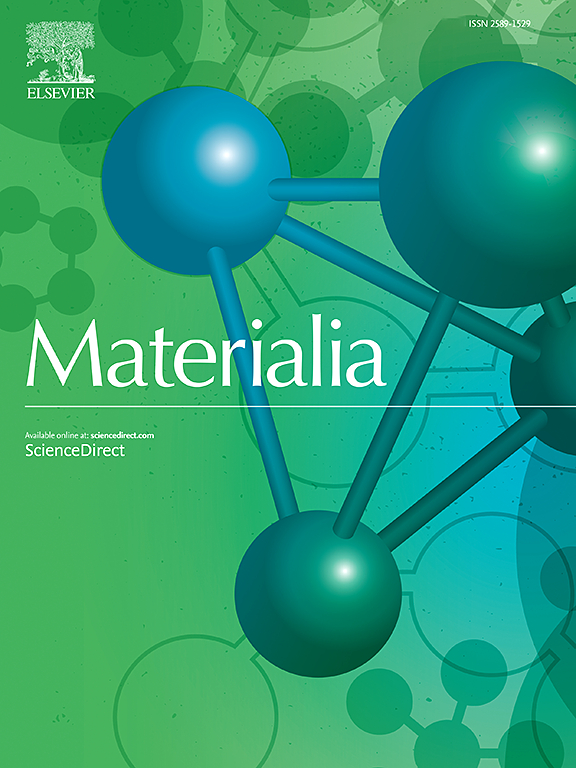用功能化聚合物冷烧结具有可控机械性能的韧性陶瓷基复合材料
IF 3
Q2 MATERIALS SCIENCE, MULTIDISCIPLINARY
引用次数: 0
摘要
陶瓷与聚合物的分层形态结构提供了大幅增强韧性的机制。通过陶瓷和聚合物颗粒的冷烧结,在与聚合物加工相适应的温度下固化无机相,从而在单一加工步骤中生成双连续复合材料。在这里,我们证明了聚丙烯(PP)的有限马来化(∼1%)提供了一种化学处理方法,可改变聚合物和无机相之间的相互作用,从而在多个长度尺度上形成更均匀的复合材料形态,这一点已在 X 射线微计算机断层扫描(µ-CT)和电子显微镜下的元素图谱中得到证实,复合材料的聚合物成分范围从 14.5 Vol% 到 68.2 Vol%。与相同成分的未官能化聚丙烯相比,复合材料的延伸性和混合复合材料的极限拉伸应力(UTS)都有大幅提高。通过对 µ-CT 数据进行定量分析,我们发现聚合物陶瓷复合材料中存在无机相和聚合物相显著混合的间相,这种间相与分层形态的产生有关。我们发现,间相的影响主要体现在纯陶瓷畴厚度的减少上。这种畴的大小与 UTS 成反比,无论 PP 的功能如何,都具有普遍性。这一观察结果强调了聚合物上的功能基团在增强复合材料均匀性、减小陶瓷畴尺寸方面的关键作用,从而增强了冷烧结陶瓷基复合材料的机械响应,为可持续复合材料提供了一条途径。本文章由计算机程序翻译,如有差异,请以英文原文为准。

Cold sintering with functionalized polymers for ductile ceramic matrix composites with controllable mechanical performance
Structuring ceramics with polymers in hierarchical morphologies provide mechanisms for substantial toughening. Bi-continuous composites are generated in a single processing step through cold sintering of ceramic and polymer particles, which consolidates the inorganic phase at temperatures compatible with polymer processing. Here, we demonstrate that limited maleation (∼1 %) of polypropylene (PP) provides a chemical handle to alter the interaction between the polymer and inorganic phases that leads to a more homogeneous composite morphology at multiple length scales, as evidenced by X-ray microcomputed tomography (µ-CT) and elemental mapping during electron microscopy for a wide range of composite compositions from from 14.5 vol% to 68.2 vol% polymer. The extensibility of the composite and the ultimate tensile stress (UTS) of the hybrid composites are increased substantially in comparison to unfunctionalized PP at the same composition. Quantitative analysis of µ-CT data identifies an interphase in polymer-ceramic composites where there is significant mixing of inorganic and polymer phases that is associated with the generation of a hierarchical morphology. We find that the impact of the interphase is primarily in the reduction of the thickness of the pure ceramic domain. This domain size is inversely correlated with the UTS with universal behavior irrespective of the functionality of the PP. This observation underscores the pivotal role of functional groups on polymers to enhance composite homogeneity, reduce ceramic domain size, and consequently augment the mechanical response of cold sintered ceramic matrix composites that provides a route to sustainable composite materials.
求助全文
通过发布文献求助,成功后即可免费获取论文全文。
去求助
来源期刊

Materialia
MATERIALS SCIENCE, MULTIDISCIPLINARY-
CiteScore
6.40
自引率
2.90%
发文量
345
审稿时长
36 days
期刊介绍:
Materialia is a multidisciplinary journal of materials science and engineering that publishes original peer-reviewed research articles. Articles in Materialia advance the understanding of the relationship between processing, structure, property, and function of materials.
Materialia publishes full-length research articles, review articles, and letters (short communications). In addition to receiving direct submissions, Materialia also accepts transfers from Acta Materialia, Inc. partner journals. Materialia offers authors the choice to publish on an open access model (with author fee), or on a subscription model (with no author fee).
 求助内容:
求助内容: 应助结果提醒方式:
应助结果提醒方式:


